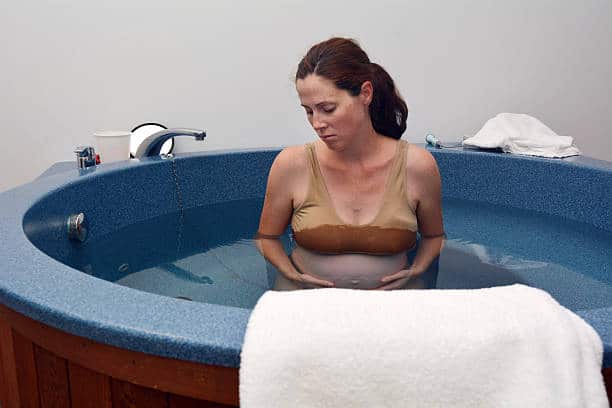Hot showers are a daily routine for many people, but for pregnant women, it’s important to consider the potential risks and complications that may arise from prolonged exposure to hot water. While a hot shower can be relaxing and soothing, it’s crucial to understand the impact it can have on the body during pregnancy.
Pregnant women may wonder how long they can safely take a hot shower without harming themselves or their developing baby. How long can I take a hot shower while pregnant? The answer is not straightforward as it depends on various factors such as the temperature of the water, the duration of the shower, and the woman’s overall health.
In this article, we will explore the potential risks and complications of hot showers during pregnancy, as well as alternatives and precautions to take to ensure a safe and healthy pregnancy.

Key Takeaways
- Hot showers during pregnancy can have potential risks and complications.
- Alternatives to hot showers can be beneficial for pregnant women.
- Consulting healthcare providers and taking precautions is essential for a safe and healthy pregnancy.
1. Understanding the Impact of Hot Showers on Pregnancy

Pregnancy is a delicate time for women, and they need to take extra care of their health during this period. One of the things that pregnant women need to be careful about is their core body temperature.
Hot showers can increase the core body temperature, which can be dangerous for the baby.
The American College of Obstetricians and Gynecologists (ACOG) recommends that pregnant women avoid hot tubs, saunas, and steam rooms because they can raise the body temperature too high. Hot showers can also have the same effect.
Overheating during pregnancy can lead to several complications, including dehydration, dizziness, and fainting. In extreme cases, it can also cause birth defects and premature labor.
Therefore, it is essential to understand the impact of hot showers on pregnancy and take necessary precautions.
When a pregnant woman takes a hot shower, the hot water raises the body temperature. The longer the shower, the higher the temperature can go.
If the core body temperature goes above 102°F, it can be dangerous for the baby. Therefore, pregnant women should avoid taking showers that are too hot or too long.
In conclusion, pregnant women need to be careful about their core body temperature during pregnancy. Hot showers can increase the body temperature and lead to several complications.
Therefore, it is recommended that pregnant women take showers that are warm, but not too hot, and avoid staying in the shower for too long.
2. Potential Risks and Complications

Hot showers can be relaxing and soothing, but pregnant women should be aware of the potential risks and complications associated with prolonged exposure to hot water.
Neural Tube Defects
One of the most serious risks associated with hot showers during pregnancy is the increased risk of neural tube defects in babies. These defects can include spina bifida, anencephaly, and gastroschisis.
Studies have shown that exposure to high temperatures during the first trimester of pregnancy can increase the risk of these defects.
Miscarriage and Early Labor
Prolonged exposure to hot water can also increase the risk of miscarriage and early labor. This is because hot water can cause the blood vessels in the body to dilate, which can lead to a drop in blood pressure.
This drop in blood pressure can cause contractions in the uterus, which can lead to early labor or even miscarriage.
Infections and Allergic Reactions
Hot showers can also increase the risk of infections and allergic reactions. This is because hot water can strip the skin of its natural oils and dry it out, making it more susceptible to infections.
Pregnant women should also be aware of the risk of thrush and yeast infections, which can be caused by the warm, moist environment created by hot showers.
Overall, pregnant women should be cautious when it comes to hot showers. While they can be relaxing and soothing, prolonged exposure to hot water can increase the risk of serious complications.
It is recommended that pregnant women limit their exposure to hot water and take shorter, cooler showers instead.
3. Effects on Body Temperature

Pregnancy can cause significant changes in a woman’s body, including an increase in core body temperature. Hot showers can further elevate body temperature, potentially leading to overheating and other adverse effects.
When pregnant, the body’s core temperature should not exceed 101°F (38.3°C) for prolonged periods. Hot showers can cause the body temperature to rise above this limit, which can lead to dehydration, dizziness, and even fainting.
Sweating is the body’s natural mechanism for cooling down. However, during pregnancy, the body’s ability to sweat may be impaired due to hormonal changes.
This can make it more difficult for the body to regulate its temperature, making hot showers even more risky.
In some cases, a fever may develop as a result of prolonged exposure to hot water. A fever during pregnancy can be dangerous and should be treated promptly by a healthcare professional.
In summary, while hot showers may be relaxing, pregnant women should be cautious about the length of time they spend in them. It is recommended that pregnant women limit their hot showers to 10 minutes or less to avoid overheating and other adverse effects on body temperature.
4. Alternatives to Hot Showers

While hot showers can be relaxing and soothing, pregnant women should avoid taking them for extended periods of time. Fortunately, there are several alternatives to hot showers that can provide the same benefits without the risks.
Warm Baths
One alternative to hot showers is taking warm baths. Warm baths can help relax the body and relieve stress, making it a great option for pregnant women.
Adding bath salts or Epsom salt to the bath can also help soothe sore muscles and reduce swelling.
However, pregnant women should avoid taking baths that are too hot, as this can increase the risk of overheating and dehydration. It is recommended that the temperature of the bathwater should not exceed 100°F (38°C).
Yoga and Exercising
Another alternative to hot showers is practicing yoga or engaging in light exercise. Yoga and exercise can help improve circulation, reduce stress, and alleviate muscle tension.
Pregnant women should consult with their healthcare provider before starting any new exercise routine. It is important to engage in low-impact exercises that are safe for pregnancy, such as walking, swimming, or prenatal yoga.
In conclusion, pregnant women should avoid taking hot showers for extended periods of time. Instead, they can opt for warm baths or practice yoga and light exercise to achieve the same benefits without the risks.
5. Precautions to Take

Pregnant women should take precautions when taking hot showers to prevent harm to themselves and their developing babies. Some of the precautions that can be taken include monitoring water temperature, staying hydrated, and preventing dehydration.
Monitoring Water Temperature
It is important to monitor the water temperature when taking a hot shower while pregnant. Water that is too hot can cause burns and harm to the developing baby.
Pregnant women should use a bath thermometer to ensure that the water temperature is not too high. The water temperature should be below 100°F (37.8°C) to prevent any harm.
Hydration and Dehydration Prevention
Pregnant women should stay hydrated when taking hot showers. Hot water can cause dehydration, which can lead to complications during pregnancy.
It is important to drink plenty of water before and after taking a hot shower to prevent dehydration.
Dehydration can cause contractions, which can lead to premature labor. Pregnant women should avoid taking hot showers for a prolonged period of time to prevent dehydration.
It is recommended to take a hot shower for no more than 10 minutes.
In conclusion, pregnant women should take precautions when taking hot showers to prevent harm to themselves and their developing babies. Monitoring water temperature and staying hydrated are important measures to take to prevent harm.
6. Consulting Healthcare Providers

When it comes to taking hot showers during pregnancy, it’s always best to consult with a healthcare provider before making any changes to your routine. This is especially important if you have any medical conditions or complications, or if you have concerns about the safety of hot water during pregnancy.
A healthcare provider can provide personalized advice based on your individual situation, including your due date and any medical history. They can also help you understand the risks and benefits of taking hot showers during pregnancy, and provide guidance on how to modify your routine if necessary.
During a consultation, a healthcare provider may recommend that you avoid hot showers altogether, or suggest that you limit the amount of time you spend in the shower. They may also recommend that you use cooler water, or avoid using certain products that could be harmful to your skin or baby.
It’s important to be honest with your healthcare provider about your shower routine, including how often you shower, how long you spend in the shower, and the temperature of the water. This information can help them provide the best possible advice and recommendations for your individual needs.
Overall, consulting with a healthcare provider is an important step in ensuring a safe and healthy pregnancy. If you have any concerns or questions about taking hot showers during pregnancy, don’t hesitate to reach out to your healthcare provider for guidance and support.
Conclusion

In conclusion, taking a hot shower while pregnant can be safe if done in moderation. Pregnant women should avoid spending too much time in hot water, as it can cause overheating and dehydration, which can harm both the mother and the baby.
Experts recommend that pregnant women keep their showers short and at a moderate temperature, around 98-100°F (36.7-37.8°C). They should also avoid using hot tubs, saunas, or steam rooms, as these can raise the body temperature to dangerous levels.
It is important to note that every pregnancy is different, and what may be safe for one woman may not be safe for another. Pregnant women should always consult with their healthcare provider before taking a hot shower or engaging in any activity that could potentially harm themselves or their baby.
By following these guidelines and seeking advice from a healthcare professional, pregnant women can enjoy the benefits of a relaxing shower while minimizing any potential risks.
Learn more from some similar posts:
Frequently Asked Questions
What temperature should I avoid when taking a shower during pregnancy?
Pregnant women should avoid taking showers with water temperature above 100°F (37.8°C). High temperatures can cause overheating, which is dangerous for both the mother and the baby.
How often should I take a shower while pregnant?
There is no set rule for how often pregnant women should take showers. However, it is recommended to shower daily to maintain good hygiene and prevent infections.
Are hot showers safe during the second trimester of pregnancy?
Hot showers are generally safe during the second trimester of pregnancy. However, pregnant women should avoid taking showers with water temperature above 100°F (37.8°C) to prevent overheating.
What are the risks of taking hot showers during the third trimester of pregnancy?
Taking hot showers during the third trimester of pregnancy can cause overheating, which can lead to dehydration and other complications. Pregnant women should avoid taking showers with water temperature above 100°F (37.8°C) to prevent such risks.
Can taking a hot shower at night harm my baby during pregnancy?
Taking a hot shower at night during pregnancy is generally safe. However, pregnant women should avoid taking showers with water temperature above 100°F (37.8°C) to prevent overheating, which can cause complications.
What are the effects of taking a bath at night while pregnant?
Taking a bath at night during pregnancy can help pregnant women relax and sleep better. However, pregnant women should avoid taking baths with water temperature above 100°F (37.8°C) to prevent overheating, which can cause complications.

Iesha is a loving mother of 2 beautiful children. She’s an active parent who enjoys indoor and outdoor adventures with her family. Her mission is to share practical and realistic parenting advice to help the parenting community becoming stronger.
